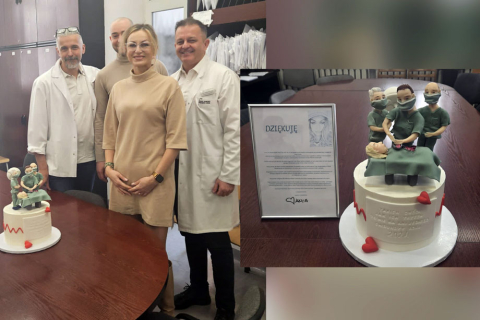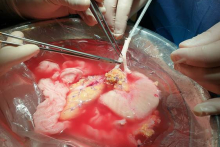The surgeries were carried out by Prof. Wojciech Lisik and Paweł Skrzypek, MD, together with the transplant team.
- It was a major organizational effort. Almost the entire medical staff of our Department participated in these two weekend procedures. Previously, there were such periods of "density" that we had 2-3 pancreas transplants in 10 days. However, such a situation to perform two transplants of this organ including one transplant - simultaneously with a kidney transplant within a few hours, we have not yet had - says Paweł Skrzypek, MD. - On the other hand, we should be used to such situations. Our Department is the only one in Poland that performs liver, kidney and pancreas transplants with the same medical team, not infrequently as multi-organ transplants. But never have there been two pancreas transplants.
It might seem that two transplants are not many, but context is important. Throughout the year, the Department of General and Transplantation Surgery UCC MUW performs 10-15 such procedures. And in Poland - no more than 30 per year. In total, in our country we have only 2 active centers for transplantation of this demanding organ.
Indications for transplantation
- Pancreas transplantation is indicated for the most severe forms of type 1 diabetes, sometimes also type 2 diabetes. Diabetics with serious diabetic complications, such as rapidly progressive retinopathy, rapidly progressive peripheral or autonomic neuropathy resulting in life-threatening hypoglycemia, are qualified for the procedure. On the other hand, pancreas-kidney transplantation is proposed for people whose diabetes has led to end-stage renal failure. Then it is the optimal method of treatment, as we simultaneously solve two problems - dialysis and the need to take insulin - says Paweł Skrzypek, MD. And he adds: unfortunately, still few patients come to us.
Diabetologists rarely offer this method of treatment. A large number of people reach us because they themselves have learned, heard, read in social media that such treatment is possible. Meanwhile, there is a no small group of patients in Poland who could benefit greatly from such treatment.
Both patients, who underwent the procedures on March 23, had type 1 diabetes. Ms. Irina, who had her pancreas transplanted along with her kidney, had been suffering from diabetes for 17 years and admits that it was a very difficult time in her life. Although she took insulin and controlled what she ate, the disease quickly began to destroy her kidneys. It got to the point that three years ago one of them had to be removed, and the one that remained was not fulfilling its role. Therefore, Ms. Irina was offered a simultaneous kidney transplant in addition to a pancreas transplant.
What the procedures consisted of
In both of our patients, the transplantation process went without major problems. Although, as Paweł Skrzypek, MD, admitted, it is a difficult and time-consuming procedure.
- The pancreas requires very careful and precise preparation before implantation. Every piece of this organ must be carefully inspected and protected. A very precise reconstruction of the organ's arterial system has to be made, the section of the duodenum that is transplanted together with the pancreas has to be shortened - and it has to be prepared in such a way that it can be anastomosed to the recipient's intestine. So a small organ, which is 12-13 cm long, still occupies us before the transplantation process itself for 2.5-3 hours. If, on the other hand, we transplant a pancreas simultaneously with a kidney, we have an additional organizational challenge. We have to involve an additional surgical team that transplants the kidney while we are preparing the pancreas. So we transplant the kidney first then the pancreas. Such a procedure takes almost six hours in total.
How the patients feel
A few days after the surgery, when asked "how are you feeling?", Ms. Irina replies that every day is getting better and better and she is looking forward to the prospect of a normal life.
- Both patients are in good mental and clinical condition. Immediately after the surgery, they took fluids and protein preparations orally, and a few days after the surgery, we started giving them "regular" food. We held back because both ladies had an anastomosis performed on the small intestine very high up in the digestive tract. We don't want the food to damage this anastomosis - that would be a very dangerous complication.
Thanks to the transplantation, both women have not had to take insulin since the surgery itself - the pancreases took up their activity instantly after the surgery. They are cured of their diabetes and will be able to function like the average person who has never had diabetes - concludes Paweł Skrzypek, MD.
Pancreas transplantation is the only causal method of treatment for insulin-dependent diabetes. Blood glucose levels normalize almost immediately. Sometimes it happens that the transplanted organ even produces too much insulin, but this is temporary and after a short time we observe normal glycemic control.
How long can such a transplanted pancreas function? This largely depends on the patient and his immune system. If the patient takes the prescribed medications, reports for check-ups, follows all the recommendations - then even 15-20 years.
Possible complications
Of course, pancreas transplants carry the risk of complications. The possibility of such complications is influenced both by the complexity of the procedure itself, the nature of the organ and the organ complications that develop as a result of diabetes. Therefore, people who are in a very severe general condition are not eligible for such treatment. If the patient has severe cardiovascular symptoms, for example, the operation could be too much of a burden for him. And, of course, it is not a method for people whose diabetes is not very severe, and whose life comfort is quite good, acceptable to the patient.
- As for the most serious complications like thrombosis of the transplanted organ - they can happen during the first days, weeks after the procedure. In our Department, the incidence of thrombosis is extremely low, because we have a carefully developed and well-thought-out transplant process, and we qualify well-prepared patients for surgery. So far, we have been exceptionally successful, because in the last 8 years we have had only one such case - informs Paweł Skrzypek, MD.
Life after transplantation
How the lives of the patients operated on March 23 will change will only be told in a few weeks, but the very fact that they don't have to take insulin introduces a revolution in their lives. This is very much felt by Ms. Ania, who recently visited the Department of General and Transplantation Surgery UCC MUW with a cake, decorated with figures depicting the three surgeons - Prof. Wojciech Lisik, Prof. Maciej Kosieradzki and Paweł Skrzypek, MD.
Ms. Ania, although she is only a few weeks post-transplant, is already feeling a huge change.
- I have suffered from diabetes since I was 22 years old. I coped with it once better once worse, because depression is inherent to diabetes. So there were ups and downs. However, the definite turning point was the pandemic. In 2020 I went through Covid-19 very badly, and that's when virtually everything went downhill. I started losing my eyesight, my kidneys were in an increasingly worse condition, neuropathy appeared - says Ms. Ania.
She met a woman who had one of the first pancreas transplants in Poland. It was from her that she learned that such treatment was possible. Ms. Ania asked her diabetologist for a referral and went to the Outpatient Clinic at the Department. She went through the qualification process and was eventually qualified for a pancreas transplant, and after two months a donor appeared and she underwent the procedure.
- A week after the surgery, I was discharged from the hospital. Already two days after the surgery, I felt as if a completely different energy had started flowing in my body. Before the transplant, I woke up every day with pain all over my body, which I associated with my neuropathy. Now, finally, nothing hurts me. The ophthalmologist said it's likely that the vision loss will be stopped. Finally, I don't have to give myself insulin! This is a completely different quality of life. If I had to consider again whether to undergo this procedure or not - I would go for it again.


